<From Overseas Office> [India] Pets in India
- Release date: Aug 01, 2023
- 13840 Views
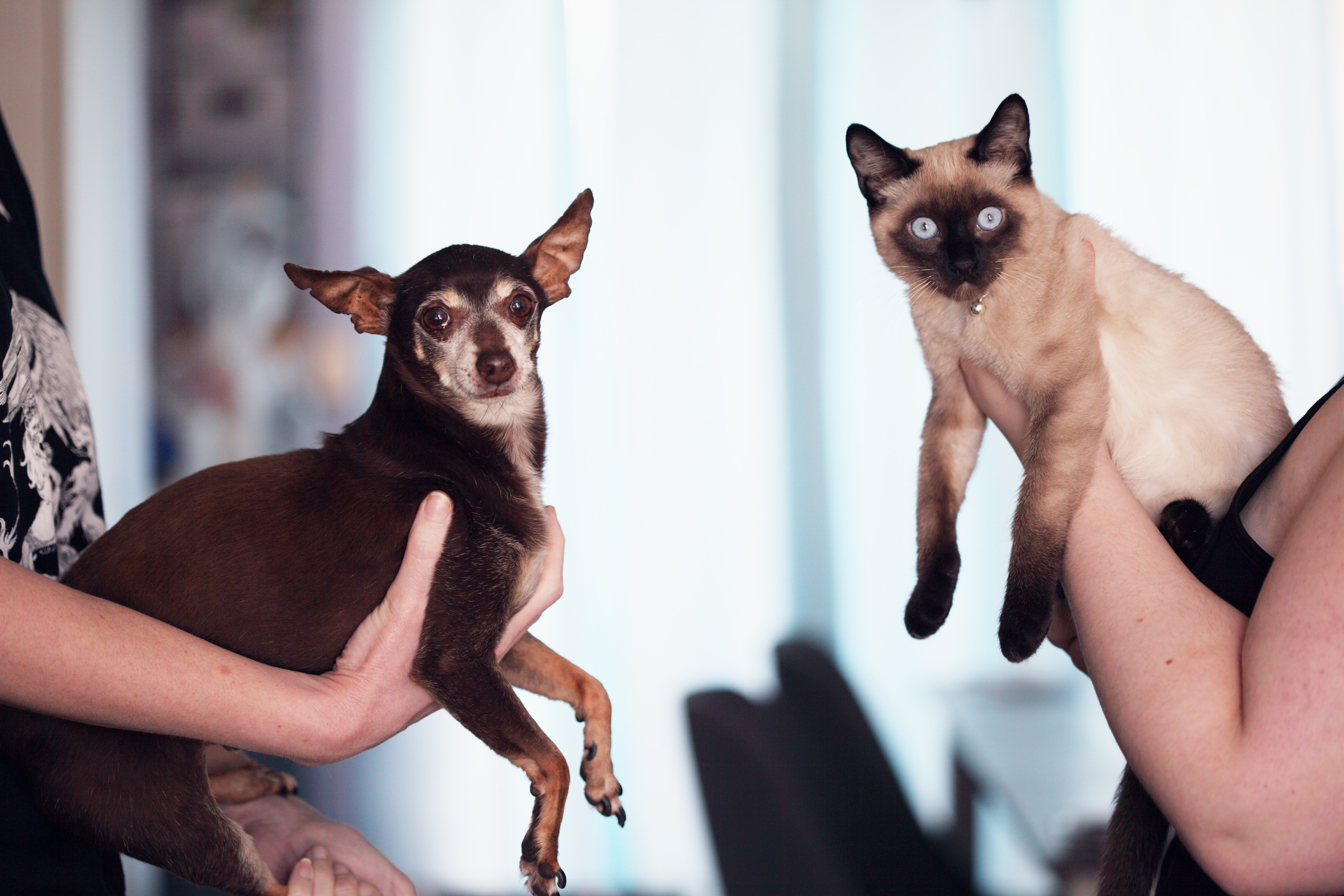
In March 2023, Intage conducted a survey of dog and cat owners in a total of four countries, including India, on their actual conditions and attitudes*. In this column, the author, who currently owns a dog in India, will introduce the pet’s environment and trends in India in more depth, using the results of the survey as a reference and sharing her own experiences.
*Click here to download the "U&A Survey on dog and cat owners ~The expanding Asian pet market 2023~" report.
A free account is required to download the software, so if you do not have one yet, please sign up here.
1. India's Pet Situation in Figures - Results of Fact-Finding and Awareness Surveys
About 70% of Indian respondents keep some kind of pet; major pets are dogs and cats
In the Intage survey, about 70% of all Indian respondents (n=625) reported owning a pet of some kind. By pet, dogs (44.8%) were the most common, followed by cats (33.9%).
Regarding pet history, about 60% of dog and cat owners said it was the first time they had owned a dog or cat.
In terms of pet ownership experience, 59.2% of dog owners (n = 233) and 62.4% of cat owners (n = 186) reported that this was their first time owning a pet.
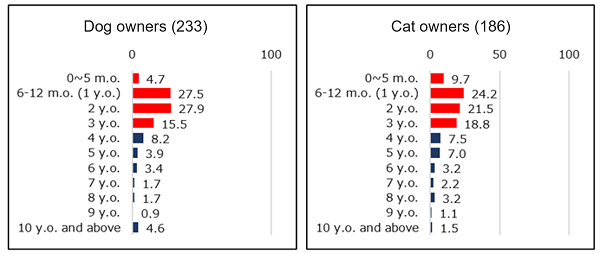
Age of older pets, majority said 3 years old or younger
The most common age of the oldest pet was 2 years old (27.9%) for dog owners and 1 year old (24.2%) for cat owners. The percentage of respondents with pets under 3 years of age was 75.6% for dog owners and 74.2% for cat owners. The top expectations of Indian pet owners before adopting a pet were that it would make them smile (43.4%), relieve loneliness (40.4%), soothe them (39.8%), cheer them up (38.0%), and be a playmate (36.1%). We can assume that many respondents started to have pet from Covid pandemic because people wanted pet to comfort them.
Usage of various types of services
For each of the pet service in the chart below, more than half of dog and cat owners answered that they use them.
In addition, nearly 90% of Indian dog and cat owners use veterinary hospitals and clinics, indicating a high level of interest in pet health.
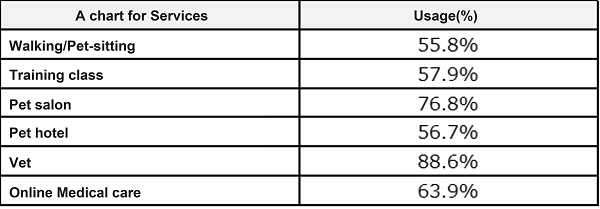
Monthly expenses on pets (average)
Cat owners tend to spend more monthly than dog owners. Both dog and cat owners spent the most on pet food, followed by pet goods.
Cat food often contains fish and tends to be more expensive than dog food, which is primarily made from chicken and widely consumed in India. In addition, while many dog treats are made in India, cat treats are mainly imported, suggesting that cat owners tend to spend more on pet food than dog owners.
***
First chart below is for Dog Owners and Second chart is for Cat Owners.
Field names (from left to right): Food, Pet goods, Hair salon, Clothes, Toys, Toiletries, Others
Field names (from top to bottom):Average price in IDR, In JPY (Rate: IDR 1 = JPY 1.7)
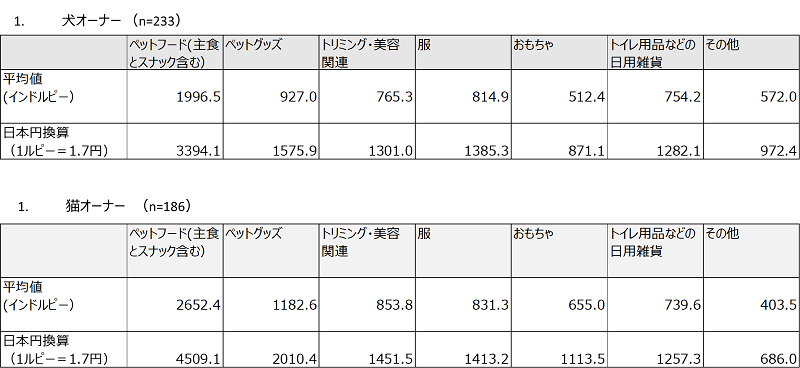
Monthly household income of dog and cat owners
In terms of monthly household income, the largest percentage of dog and cat owners (34%) answered that their household income was 100,000 Indian rupees (approximately 170,000 Japanese yen) or more. This suggests that many pet owners are relatively financially well-off.
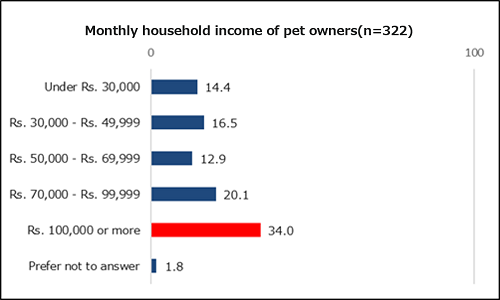
2. Deep dive by topic
The Indian pet care market is estimated to have reached US$490 million* (about 70 billion Japanese yen) in 2022, of which US$310 million is for pet food, US$90 million for pet pharmaceuticals, US$65 million for pet accessories, and the rest for other pet care products.
Compared to Japan, where the total pet-related market is estimated to exceed 1.75 trillion yen* in 2022 and the pet care market alone is estimated to exceed 900 billion yen, India's market size is still small, but the potential is high in light of the growing middle-income class and strong economic growth year by year. In fact, the Indian pet care market has recorded double-digit growth in recent years and is expected to reach $800 million by 2025.
In this section, we would like to go more in details regarding the situation around pets in India by topic.
(Source1: https://petkeen.com/pet-industry-statistics-india/)
(Source2: https://www.yano.co.jp/press-release/show/press_id/3053 )
(1) Veterinary Hospitals and Clinics in India
Veterinary hospitals and clinics in India can be divided into three main categories (1. private clinics, 2. medium-sized hospitals, and 3. large hospitals).
<Private Clinic>
A small clinic privately owned and operated by a veterinarian. The clinic is privately owned and operated by a veterinarian, and basically has space for only one animal for medical treatment and surgery. Clinic hours are often divided into morning (10:00~14:00) and evening (17:00~20:00), with no daytime or late-night hours. It is positioned like a town doctor. The consultation fee is 300~500 rupees (about 510~850 yen).
<medium-size hospital>
Separate examination rooms and operating rooms are provided. The examination room can handle several animals at one time. The staff consists of a resident veterinarian (generally one or two) and several veterinary nurses. The clinic is open from morning until night (9:00 p.m.). In case of emergency, the clinic is open late at night. The consultation fee is around 700 rupees (about 1,190 yen).
<large hospital>
In addition to examination and operating rooms, there are facilities for physiotherapy and an ICU. It has several veterinarians (3 or more) on staff and a large number of veterinary nurses. It also has a pet hotel, spa, and pet supply store. The consultation fee is around 1,000 rupees (approximately 1,700 yen). Late-night fees apply.
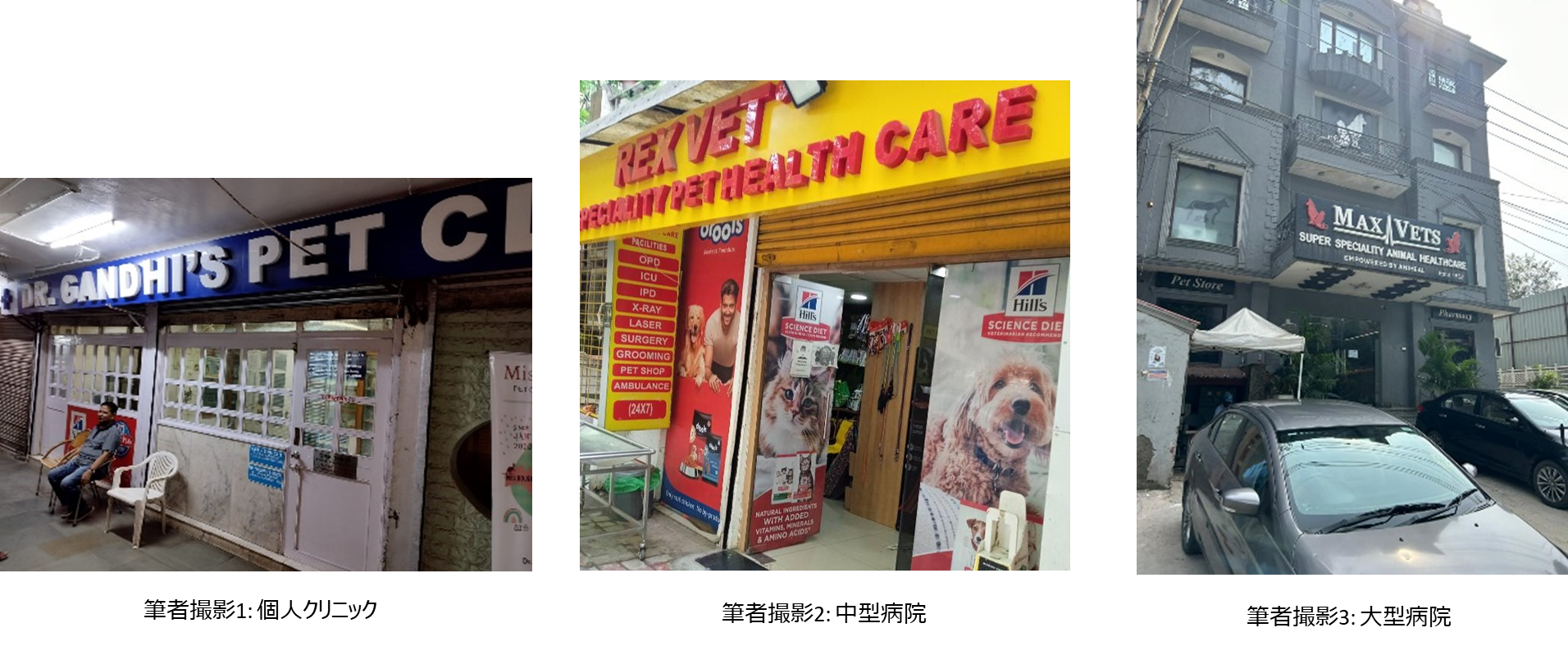
Photos of private, medium-sized and large-sized vet hospitals from left to right.
<Japanese Veterinary Hospital>
Japanese-affiliated veterinary hospitals are also expanding into India, with DCC Animal Hospital (https://dccpets.in/), a veterinary hospital operated by a wholly owned Indian subsidiary of Singapore-based Japanese company A'alda Pte. It operates two stores in Delhi and one in Gurgaon. The Gurgaon store also has a pet hotel. It has its own mobile app and offers services such as remote medical care. It is a veterinary hospital that is distinct from conventional veterinary hospitals and is positioned as a "premium" veterinary hospital. They are also actively marketing their services through social networking sites such as Instagram.
(2)Rapidly Growing Pet Shops
In recent years, the number of pet stores in India has increased rapidly. There are eight pet stores within walking distance (within 500 meters) of the author, who lives in Delhi. In the past, pet stores with a local atmosphere, such as the one in the photo on the right, were common, but in recent years, the number of pet stores with a fashionable atmosphere, such as Heads up for tails, has been increasing. These pet stores often have a trimming space attached to the store, allowing customers to visit the store with their pets.
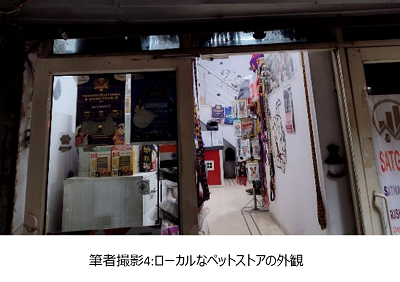
Photo by author No. 4: Outer view of a local pet store
Heads up for tails, a pet store that offers a wide range of pet-related products, including its own branded products, is one of India's leading pet-related startups. founded in 2008, the company successfully raised $37 million in a Series A round in August 2021. The company currently operates 82 stores across India.
The major difference between Indian pet stores and Japanese pet stores is that no living animals (dogs and cats) are sold in the stores. In India, dogs and cats are generally purchased directly from breeders or acquired from animal welfare organizations or people.
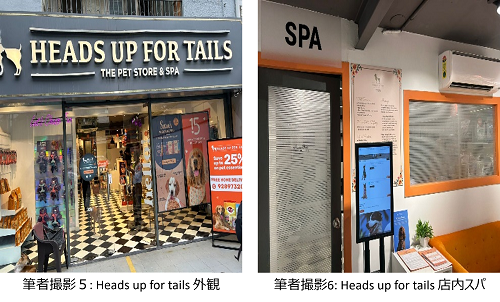
Photo by author No. 5: Exterior view of Heads up for tails / No.6: Spa inside of Heads up for tails
(3)Popular dog and cat breeds in India
In India, large dogs are more common than small dogs. Dog breeds often seen in parks include German Shepherds, Golden Retrievers, and Labrador Retrievers among large dogs, and Beagles and Shih Tzus among small dogs. The number of dog breeds kept in Japan is far fewer than in Japan. The number of people who own "Indie" dogs, a breed native to India, is also increasing. Indie dogs often come from stray dogs.
On the other hand, Persian cats and British Shorthairs are widely kept among cats. Many people also own stray cats, and these cats are often hybrids.
(4)Major pet food brand in India
In India, in addition to the various dog food brands of Mars Inc. of the U.S., Pedigree, Chappi, and Royal Canin, Drools (https://drools.com/), a dog food brand from India, is a major player. Drools uses famous Bollywood stars in its advertisements and packaging, and conducts marketing mainly through social networking services. In the cat food market, in addition to international brands Whiskas and Sheba, India's Purepet (part of the same group as Drools) is also a major player.
Drools : https://drools.com/
(5)Natural-oriented for pets
Many people in India dislike "chemicals/additives" and prefer "natural/additive-free" products, which is also shared by pet owners.
<Additive-free snacks>
Founded in 2018, Canine cravings is a Bangalore startup that manufactures and sells additive-free treats (animal based) for pets. They have a wide selection of products and are loved by many pet owners. The author also uses their products and Buffalo Bone is my dog's favorite.
Canine cravings : https://caninecraving.com/
<Vegetarian additive-free snacks>
Many vegetarian pet owners want to provide their own pets with plant- or dairy-based, additive-free treats. Responding to the needs of such pet owners is Dogsee chew, a startup founded in 2015 that manufactures and sells dairy- and plant-based additive-free treats, with chew cheese, a bone substitute, being the company's flagship product. The company raised $7 million in a pre-series A round in 2021.
Dogsee chew:https://www.dogseechew.com/
<Nutritional consultants exclusively for pets>
Many people are feeding their pets homemade food instead of dog food, and online nutrition consultants specializing in pets offer services such as menu planning and video consultations. These pages are widely used by pet owners, and Instagram is the primary source of information.
GEORGINA'S KITCHEN:https://georginaskitchen.com/
Balanced Nutrition for Dogs:https://eternalcaninenutrition.com/
<Natural-oriented hair care and bath products for pets>
Many pet owners also prefer natural hair care and bath products for their pets. A Bangalore-based brand called Back in the day offers completely natural products based on Ayurveda. The brand's "Scooby dub dub" powder is a five-herb flea and tick control powder that is mixed with coconut oil. The powder has spread by word of mouth among pet owners and animal welfare organizations. The author is also a user of this product.
Back in the day:https://backintheday.in/
(6)Where pet owners exchange information: Instagram, apps, etc.
Instagram is the most popular place for Indian pet owners to exchange information. Many pet owners operate Instagram accounts for their pets.
Sploot, an information-sharing application for dog owners, has more than 30,000 active users, and allows users to easily discuss their dog-related problems with other fellow dog owners. The app also offers a variety of information about dogs, as well as services such as dispatching dog walkers, offering online classes with experts, providing fresh dog food, and conducting joint walks. Sploot raised $500,000 in a seed round in 2022.
(7)Well used service in India (dog walker)
Dog walkers are rarely seen in Japan, but are extremely common in India. There are two types of employment: dog walkers dispatched through companies and dog walkers on individual contracts, with the latter being more common. In addition, many households have hired staff (maids and drivers) to walk dogs at home. India also has a large population of stray dogs, and it is often difficult to walk dogs in areas with aggressive stray dogs. Against this background, the demand for specially trained dog walkers is also growing.
(8)Services commonly used in India (pet sitting facilities and pet hotels)
Pet sitting services are also common in India. The types of pets that can be kept are dogs, cats, rabbits, etc. The private pet sitting services that the author often uses is located at an apartment, and basically allows pets to roam free inside. The fee is about 1,000 rupees (about 1,700 yen) per night, including meals, three walks, and video updates sent several times a day.
In addition to the privately owned pet sitting facilities used by the author, there is also a resort-type pet hotel with private rooms equipped with AC. Rates start at 2,000 rupees (about 3,400 yen) per night. However, most of these pet hotels are located in the suburbs and are not conveniently located.
(9)Well-used services in India (online classes on dog training)
Many Indian pet owners, mostly beginners, have trouble training their dogs. Online classes (individual or group) with professional dog trainers are becoming increasingly popular among such people. When I first got my dog, I took a one-on-one online class (one hour per class). The fee was about 6,000 rupees (about 10,200 yen) for a total of six sessions. The trainer customized the agenda according to my concerns.
As a last resort, there are also boarding dog schools. The fee is about 95,000 rupees (about JPY 161,500) for eight weeks. The school is used by dog owners who do not have time to train their dogs or who are having trouble training their dogs. The k9 school in Delhi is led by a famous trainer who is a pioneer in dog training in India and is also in charge of training police dogs.
k9 school:https://www.k9school.in/
(10)Pet tech startups
Although not as numerous as in Japan, there are some pet tech startups in India. Online medical care is extremely common in India.
<Wiggles>
Based in Pune, Wiggles offers a one-stop solution for pet parents to purchase pet-related products (pet food, pet supplies, pet medications) and book all pet-related services (online medical care, online nutritional counseling, pet hotels, day care).
Wiggles : https://www.wiggles.in/
<Patmypets>
Based in Noida, Patmypets provides a platform for booking appointments for groomers, dog trainers, and dog walkers to come to your home, as well as online medical care.
Patmypets : https://patmypets.com/
<Veteva>
Mumbai-based Veteva has developed a comprehensive mobile app for pet healthcare. The app allows pet parents to have an instant video consultation with an experienced and trusted veterinarian. The online store also offers a wide range of pet medications and supplements.
Veteva : https://www.veteva.com/
<Nimble Wireless>
Nimble Wireless is an Indian startup based in the United States. It has offices in Bengaluru and Coimbatore. The company uses IoT technology to provide a service that allows users to monitor their pet's environment (temperature, humidity, etc.) while on the go.
Nimble Wireless : https://nimblewireless.com/
<PETTLE>
Mumbai-based PETTLE develops and provides pet business management software for pet-related businesses.
PETTLE : https://getpettle.com/
(11)Stray dogs and animal welfare
As anyone who has visited India knows, there are many stray dogs on the streets of India, and according to the Stray Animal Foundation of India, there are an estimated 62 million stray dogs and 9.1 million stray cats in India. Basically, these stray dogs and cats coexist with people and have been fed on leftover food from their homes. In recent years, however, this situation is changing.
In Delhi, where the author lives, several animal welfare organizations systematically provide meals to stray dogs living in their areas of operation. In the mornings and evenings, one often encounters staff members serving meals to stray dogs. These animal welfare organizations collect donations through social networking sites such as Instagram in the form of meal sponsorships, where one unit of 500 rupees (about 850 yen) can sponsor a month's meal for one stray dog, or any amount.
In addition to providing food, these animal welfare organizations check the health of stray dogs on a daily basis and provide medical care when needed. They also work on neutering and vaccinations.
3.Sharing Author’s Real Experiences
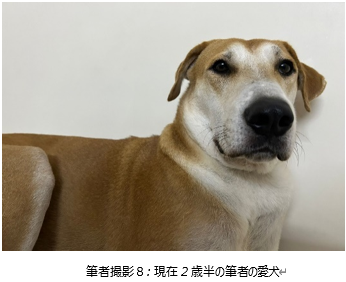
Photo taken by author No.8: My 2 and half year-old dog
I would like to share the author's real experience here. My dog, a mix with a stray mother, was adopted from an animal welfare organization in 2021. The process of adopting was to search for dogs for adoption on Instagram and contact the animal welfare organization. After going through the process of document screening and remote house check, we welcomed him to our home about 2 months after applying.
<Sources for adopting>
Basically, I use Instagram. I follow several animal welfare organizations and famous dogstagrammers. I often use brands and recommended products tagged by those accounts.
<Food expense>
I feed a homemade meat-based diet. I also feed them buffalo bones, additive-free snacks, and cookies. Therefore, I spend about 10,000 rupees (about 17,000 yen) for food every month.
<Medical expenses>
The hospital where my dog (medium-sized dog, weighing 30 kg) is enrolled is a medium-sized hospital according to the aforementioned hospital classification. The actual costs are shown below.
① Castration: Total of 7,500 rupees (about 12,750 yen)
Neutering is also recommended in India to prevent future diseases. Neutering is included in the conditions for adopting a dog, and my dog was also neutered. The cost was 1,500 rupees (about 2,550 yen) for a blood test before the surgery and 6,000 rupees (about 10,200 yen) for the castration. Incidentally, the stitches were of the dissolvable type and did not need to be removed.
② Vaccination: 3,000 rupees (about 5,100 yen)
Like dogs in Japan, they are vaccinated once a year against rabies and DHPPi (five-dose). The cost is about 3,000 rupees.
③ Administration of oral medication for internal parasite control: 500 rupees (about 850 yen)
I regularly administer an oral medication for internal parasite control once every 2~3 months. This is because there are many stray dogs in India, and the risk of infection during walks is high. The price of the medication is about 500 rupees per tablet.
④ General consultation: 700 rupees (about 1,190 yen)
Basically, I pay a flat fee of 700 rupees (about $1,190) for a medical examination only. Small concerns and worries may also be discussed directly with the doctor (free of charge) using WhatsApp.
<Pet Supplies>
I mainly buy pet accessories from Heads up for tails and Amazon. One of my favorite brands is Forfurs, which carries a wide range of pet accessories; founded in 2018 and based in Kanpur, the company has been steadily increasing sales despite small-lot production. The company's flagship product, the Martingale Collar, is a favorite of my dog.
<Difficulties>
Unlike in Japan, there are many stray dogs in the area, making it very difficult to take a walk. I have had two or three incidents where my dog was bitten by stray dogs, and I had to go to the hospital each time. Also, many people in India consider dogs to be dangerous, and I have had many unreasonable comments from people when I was walking my dog in the park. For this reason, he carefully selects the areas where he will live, with a focus on dogs.
-
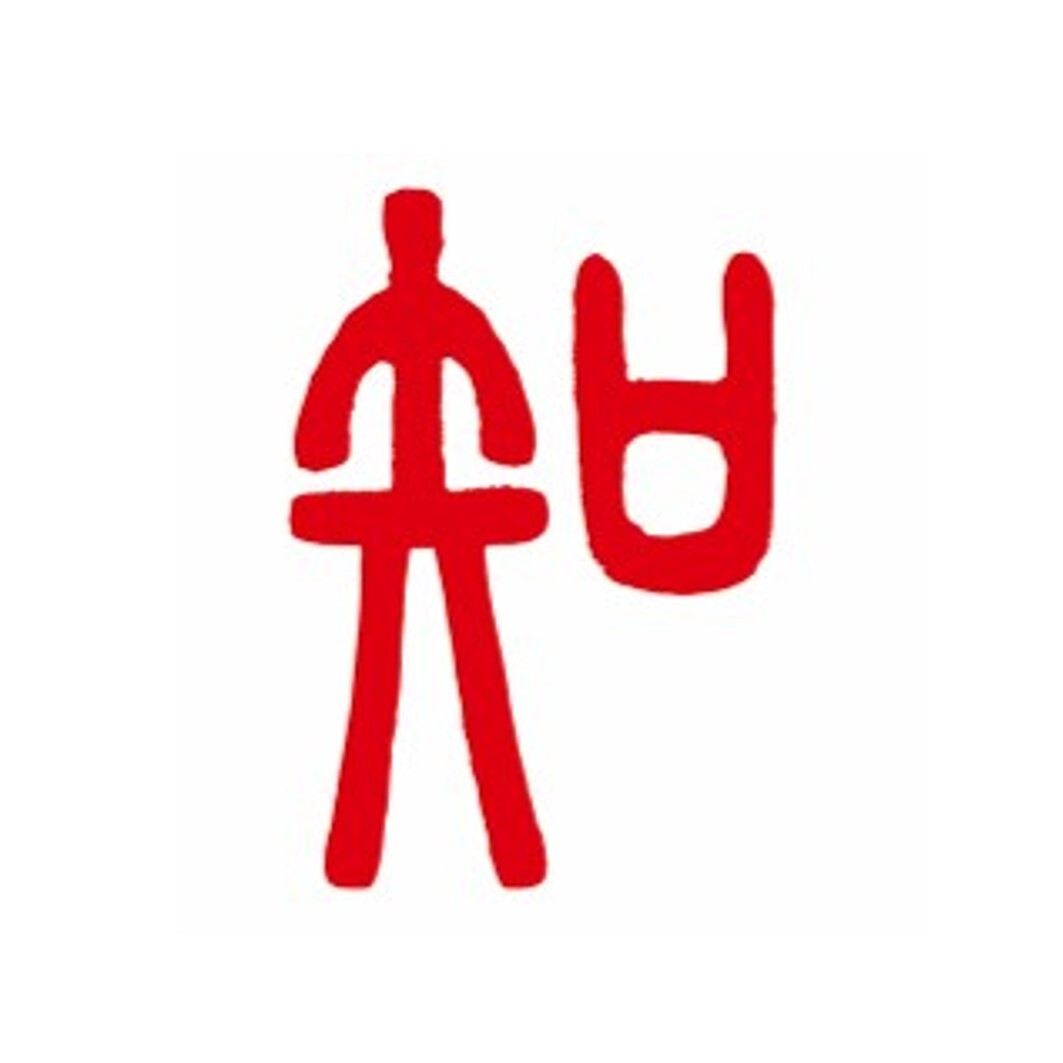
Author profile
Yumi Shiratori
Japanese researcher living in New Delhi, the capital of India. She is currently working on market research with Indian members.
 Global Market Surfer
Global Market Surfer CLP
CLP